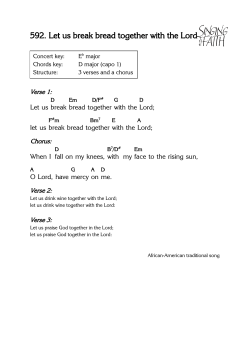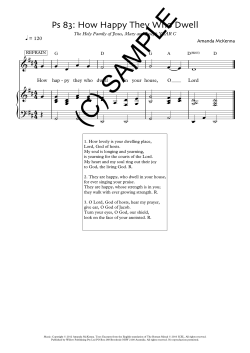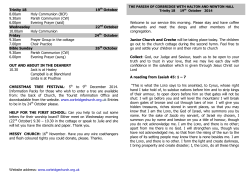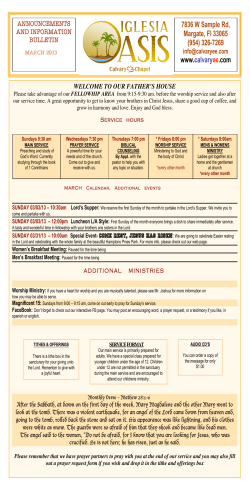
Adult Sunday School Lesson The Book of Zephaniah
Adult Sunday School Lesson The Book of Zephaniah Zephaniah 1:1-11 Living with the Specter of Judgment March 8, 2015 Situational Context: The prophet Zephaniah was evidently a person of considerable social standing in Judah and was probably related to the royal line. The prophecy opens with a statement of the author's ancestry (1:1), which in itself is an unusual feature of the Hebrew prophetic tradition. Zephaniah was a fourth- generation descendant of Hezekiah, a notable king of Judah from 715 to 686 BC. Apart from this statement, nothing more is said about his background. Whereas the prophet Micah dealt carefully and sympathetically with the problems of the common people of Judah, Zephaniah's utterances show a much greater familiarity with court circles and current political issues. Zephaniah was probably familiar with the writings of such prominent eighth- century prophets as Isaiah and Amos, whose utterances he reflects, and he may also have been aware of the ministry of the young Jeremiah. According to 1:1, Zephaniah prophesied during the reign of King Josiah (640–609 BC), making him a contemporary of Jeremiah, Nahum and perhaps Habakkuk. His prophecy is probably to be dated relatively early in Josiah's reign, before that king's attempt at reform (and while conditions brought about by the reigns of Manasseh and Amon still prevailed) and before the Assyrian king Ashurbanipal's death in 627 (while Assyria was still powerful, though threatened). Lesson Theme: The intent of the author was to announce to Judah God's approaching judgment. A Scythian incursion into Canaan may have provided the immediate occasion. This fierce people originated in what is now southern Russia, but by the seventh century BC they had migrated across the Caucasus and settled in and along the northern territories of the Assyrian Empire. Alternately the enemies and allies of Assyria, they seem to have thrust south along the Mediterranean sometime in the 620s, destroying Ashkelon and Ashdod and halting at the Egyptian border only because of a payoff by Pharaoh Psamtik (Psammetichus). Ultimately, however, the destruction prophesied by Zephaniah came at the hands of the Babylonians after they had overpowered Assyria and brought that ancient power to its end. NIV SB Notes The reason for the LORD’s judgment upon Judah was her spiritual compromises; that judgment is also coming upon the whole earth. Zephaniah 1:3 (NIV) "I will sweep away both men and animals; I will sweep away the birds of the air and the fish of the sea. The wicked will have only heaps of rubble when I cut off man from the face of the earth," declares the Lord. 1. Universal Judgment, Zephaniah 1:1-3 (NIV) 1 The word of the Lord that came to Zephaniah son of Cushi, the son of Gedaliah, the son of Amariah, the son of Hezekiah, during the reign of Josiah son of Amon king of Judah: 2 "I will sweep away everything from the face of the earth," declares the Lord. 3 "I will sweep away both men and animals; I will sweep away the birds of the air and the fish of the sea. The wicked will have only heaps of rubble when I cut off man from the face of the earth," declares the Lord. Interpretation: The prophet begins with an announcement of universal judgment (vv. 2, 3), and quickly particularizes it against Judah and Jerusalem (v. 4). Three specific sins are denounced: idolatry (v. 4), syncretism (v. 5), and religious indifference (v. 6). Supporting Texts: Genesis 6:7 (NIV) So the Lord said, "I will wipe mankind, whom I have created, from the face of the earth--men and animals, and creatures that move along the ground, and birds of the air--for I am grieved that I have made them." 2 Peter 2:4-9 (NIV) 4 For if God did not spare angels when they sinned, but sent them to hell, putting them into gloomy dungeons to be held for judgment; 5 if he did not spare the ancient world when he brought the flood on its ungodly people, but protected Noah, a preacher of righteousness, and seven others; 6 if he condemned the cities of Sodom and Gomorrah by burning them to ashes, and made them an example of what is going to happen to the ungodly; 7 and if he rescued Lot, a righteous man, who was distressed by the filthy lives of lawless men 8 (for that righteous man, living among them day after day, was tormented in his righteous soul by the lawless deeds he saw and heard)-- 9 if this is so, then the Lord knows how to rescue godly men from trials and to hold the unrighteous for the day of judgment, while continuing their punishment. 2 Peter 3:5-7 (NIV) 5 But they deliberately forget that long ago by God's word the heavens existed and the earth was formed out of water and by water. 6 By these waters also the world of that time was deluged and destroyed. 7 By the same word the present heavens and earth are reserved for fire, being kept for the Day of Judgment and destruction of ungodly men. Discussion Starters: Why do the words of warning to Judah begin with words of warning to the whole human race? What do these verses say about God’s view of sin? In what ways do we foolishly downplay our own sin? 2. The LORD Will Clean His House, Zephaniah 1:4-6 (NIV) 4 "I will stretch out my hand against Judah and against all who live in Jerusalem. I will cut off from this place every remnant of Baal, the names of the pagan and the idolatrous priests-- 5 those who bow down on the roofs to worship the starry host, those who bow down and swear by the Lord and who also swear by Molech, 6 those who turn back from following the Lord and neither seek the Lord nor inquire of him. Interpretation: Three specific sins are denounced: idolatry (v. 4), syncretism (v. 5), and spiritual indifference (v. 6). Baalism is a fertility cult god and goddess. These are the sins of Judah, v.4. Supporting Texts: 2 Kings 23:5 (NIV) He did away with the pagan priests appointed by the kings of Judah to burn incense on the high places of the towns of Judah and on those around Jerusalem--those who burned incense to Baal, to the sun and moon, to the constellations and to all the starry hosts. 1 Corinthians 6:18 (NIV) Flee from sexual immorality. All other sins a man commits are outside his body, but he who sins sexually sins against his own body. Revelation 9:21 (NIV) Nor did they repent of their murders, their magic arts, their sexual immorality or their thefts. Exodus 20:3 (NIV) "You shall have no other gods before me. Discussion Starters: How is sexual immorality idolatry? Define and identify modern forms of syncretism. What is the sign of indifference? How could a professed Christian turn back form following the LORD? 3. No Protest Allowed, No Favoritism, Zephaniah 1:7-11 (NIV) 7 Be silent before the Sovereign Lord, for the day of the Lord is near. The Lord has prepared a sacrifice; he has consecrated those he has invited. 8 On the day of the Lord's sacrifice I will punish the princes and the king's sons and all those clad in foreign clothes. 9 On that day I will punish all who avoid stepping on the threshold, who fill the temple of their gods with violence and deceit. 10 "On that day," declares the Lord, "a cry will go up from the Fish Gate, wailing from the New Quarter, and a loud crash from the hills. 11 Wail, you who live in the market district; all your merchants will be wiped out, all who trade with silver will be ruined. Interpretation: Judah’s day of reckoning is drawing near. The instrument of the LORD’s judgment will be a foreign nation. The sacrifice is Judah herself. Those in positions of power and authority draw the LORD’s special mention for judgment and also those wealthy merchants who value riches over godliness and duty. Supporting Texts: Habakkuk 2:20 (NIV) But the Lord is in his holy temple; let all the earth be silent before him." Matthew 22:11-14 (NIV) 11 "But when the king came in to see the guests, he noticed a man there who was not wearing wedding clothes. 12 'Friend,' he asked, 'how did you get in here without wedding clothes?' The man was speechless. 13 "Then the king told the attendants, 'Tie him hand and foot, and throw him outside, into the darkness, where there will be weeping and gnashing of teeth.' 14 "For many are invited, but few are chosen." Discussion Starters: What did the LORD mean by foreign clothes in verse 8? Why would the LORD single out the princes and rulers? What was their role in Judah’s condition? Why would the LORD single out the merchants? What was their role in Judah’s condition?
© Copyright 2025











